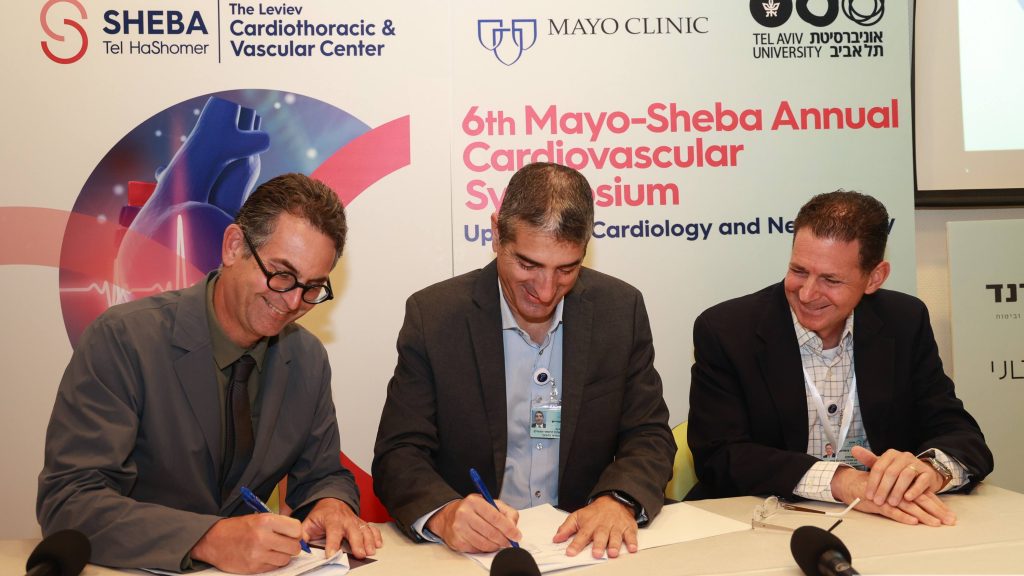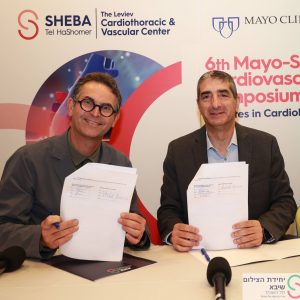Mayo Clinic, Sheba Medical Center sign agreement to accelerate health technology growth

-
Mayo Clinic, Sheba Medical Center sign agreement to accelerate health technology growth

ROCHESTER, Minn., and TEL AVIV, Israel — Mayo Clinic and Sheba Medical Center have signed an agreement that will make it easier to share health technology and support early stage startup companies. This collaboration will create an environment that enables rapid product development in the U.S. and Israeli markets, allowing technologies to be established and launched to transform health care delivery for all.
The initial focus of this collaboration will be on cross referral and participation of startup companies from the Mayo Clinic Platform Accelerate and Sheba Medical Center’s ARC Innovation Center. ARC stands for accelerate, redesign and collaborate.
Launched earlier this year, the Mayo Clinic Platform_Accelerate program helps early stage health technology artificial intelligence companies get market ready. Mayo Clinic Platform is a strategic initiative to improve health care through insights and knowledge derived from data. ARC Innovation Center brings together physicians, researchers, startups, industry leaders, academia, investors and top-tier medical centers to redesign health care.

“We are pleased to continue to grow our innovation ecosystem with Sheba Medical Center to address complex health care challenges,” says John Halamka, M.D., president of Mayo Clinic Platform. “This agreement gives Mayo Clinic and Sheba a first look into technologies that can transform patient care globally.”
Journalists: This video clip with Dr. John Halamka, President of Mayo Clinic Platformis in the downloads at the end of this post. Please courtesy: “Mayo Clinic News Network.”
Eyal Zimlichman, M.D., chief information and transformation officer at ARC Innovation Center, adds: “As two leading health care organizations, Sheba Medical Center and Mayo Clinic are committed to transform health on a global scale. This collaboration will allow us to accelerate development and large-scale implementation of cutting-edge technologies. And at the end of the day, this work will provide value to patients, families and communities. We look forward to the journey ahead.”
Mayo Clinic and Sheba Medical Center leaders signed this agreement at the Sixth Mayo-Sheba Annual Cardiovascular Symposium that is being held June 26–28 at the ARC Innovation Center on the Sheba Medical Center campus in Tel Aviv.
The collaboration between the two organizations began in 2016 by bringing together Mayo Clinic and Sheba Medical Center experts in cardiology and nephrology to share information and expertise to improve patient care.
###
About Sheba Medical Center
Sheba Medical Center, Tel Hashomer, is generating global impact through its medical care, research and healthcare transformation. Sheba’s City of Health boasts an acute-care hospital, rehabilitation hospital, research and innovation hubs, medical simulation center, as well as a center for disaster response on one comprehensive campus in the heart of Israel. Sheba serves as a true hospital without borders, welcoming patients and healthcare professionals from all over the world. For more information, visit: eng.sheba.co.il
About Mayo Clinic Platform
Founded on Mayo Clinic’s dedication to patient-centered care, Mayo Clinic Platform enables new knowledge, new solutions and new technologies through collaborations with health technology innovators to create a healthier world. To learn more, visit the Mayo Clinic Platform website.
About Mayo Clinic
Mayo Clinic is a nonprofit organization committed to innovation in clinical practice, education and research, and providing compassion, expertise and answers to everyone who needs healing. Visit the Mayo Clinic News Network for additional Mayo Clinic news.
Media contacts:
- Steve Walz, Sheba Medical Center, steve.walz@sheba.health.gov.il
- Susan Barber Lindquist, Mayo Clinic Public Affairs, newsbureau@mayo.edu



